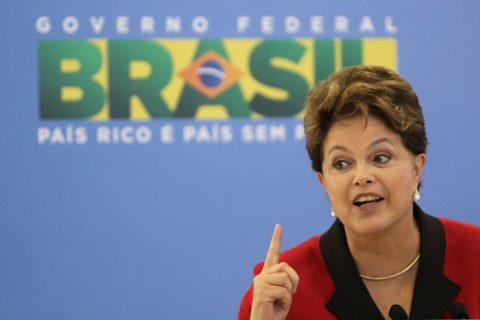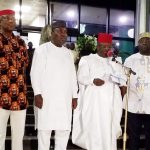The Struggle for Brazil, By Owei Lakemfa
Articles/Opinion, Featured Contributors/Columnists, Latest Headlines Saturday, April 16th, 2016
BALTIMORE, MD (AFRICAN EXAMINER) – There is an on-going struggle for the soul of Brazil, the world’s fifth largest country which has become a model of how to rescue millions from abject poverty. The battles may well turn bloody because it is not strictly a fight over constitutionalism, corruption or the economy; it is primarily, a struggle of the social classes.
The decision on Monday April 11, 2016 by a Congressional Committee voting 38-27 to recommend President Dilma Roussef for impeachment may well be the trigger. The basis for the recommended impeachment proceedings, is nebulous; that she did not in 2014, disclose the true size of the budget deficit, which tantamount to an abuse of office and therefore, impeachable.
Roussef’s predecessor, the famous Labour leader, Luiz Inacio Lula da Silva who led the ruling Workers Party to victory in 2003, argues that : “Impeachment without a legal basis is a coup, there is no other word…They want to shorten President Dilma [Rousseff]’s term through a coup”
If it is not a coup, it looks like one. First, there has been a local and international media conviction of President Roussef for corruption over the Petrobras Scandal, even when she has neither been implicated nor charged. Secondly there have been orchestrated protests over various issues including the building of stadia for the 2014 FIFA World Cup. Thirdly, having failed so far to implicate her in the corruption case, and being in a hurry to impeach her, a nebulous charge of not disclosing the state of the economy is being used as basis for impeachment. Fourthly, in a brazen manner, the telephone conversations between the President and her predecessor were bogged and released by public officials. Fifthly, taped conversations and witness statements in the Petrobras case were released by Federal Judge, Sergio Moro ostensibly to infuriate the populace even before suspects had their day in court. Sixthly, even before the Congressional Committee’s vote to recommend impeachment proceedings to the Congress, Vice President Michael Temer – who is facing impeachment charges – had made a 14-minute recorded speech to the Brazilian people announcing his takeover of the Presidency stating that his “great mission from now is the calming of the country (and) the unification of the country.”
What has given advantage to the opposition is the economy which may shrink this year by 3.5 percent, currency devaluation and unemployment growth from 5.8 percent in 2015 to 8 percent this year. This level of unemployment will count for nothing in most countries, but not in Brazil where the ruling party had raised the bar in social spending and services. The party had embarked on far reaching social programmes including the Eradication of Hunger (Zero Hunger) paying family, food and gas allowances, and social payment to the poor. Such huge social spending has not gone down well with the elites, right wing parties and international finance for whom Market Forces is the only religion permissible.
The unfolding scenario in Brazil, is taking a familiar path in South America; one taken when the elites and quite often, international capital having lost control, decide to overthrow a Pro-poor Government and regain the initiative.Guatemala was under the Jorge Ubico dictatorship when a peoples revolt swept it off and popular elections conducted in 1944. The winner, Juan Jose Arevalo introduced Pro-poor reforms. His Defence Minister, Jacobo Arbenz was elected to replace him in 1950. He deepened the reforms by abolishing what amounted to slave labour and redistributing lands to poor farmers. The American United Fruit Company whose business was badly affected by these policies appealed to its home government for assistance. In 1952, President Harry Truman authorized the overthrow of the Arbenz administration in a Central Intelligence Agency (CIA) Operation PBFORTUNE which was to be militarily backed by Nicaraguan dictator, General Anastazio Somoza. The plan leaked and was abandoned. That same year, Dwight D. Eisenhower was elected American President. He authorized a second attempt under Operation PBSUCCESS. This required propaganda and instigation of protests and the training of a mercenary group led by Carlos Castillo Armas. The mercenaries invaded Guatamala on June 18, 1954, and with an American threat to send in troops to back the mercenaries, the government was overthrown and Armas took over. For the next 42 years, Guatamala was under military dictatorship and severe repression which led to a civil war.
Brazil in the early sixties had a Pro-poor government similar to the current one. The then President Joao Goulart of the Brazilian Labour Party introduced social reforms and decided to socialize the profits of the transnational corporations, nationalize the oil refineries and introduce rent controls. He was labeled a communist and atheist and mass demonstrations called ‘Marches of the Family with God for Freedom’ were organized. Then, a section of the military leadership was funded by America to carry out a coup. On March 30, 1964, the American Military Attaché, Colonel Vernon. A. Walters telegraphed the State Department that the support of the Brazilian generals had been secured for the coup. The next day, the coup began; it took two days to oust the president and impose a bloody military dictatorship.
On April 11, 1964, the Congress ‘elected’ General Humberto de Alencar Castello Branco as President. He promised to hand over to an elected President in two years, rather, the military remained in power for 21 years during which many were tortured, killed or “disappeared”. President Roussef was one of those detained and tortured and her two immediate predecessors; Lula and Fernando Henrique Cardosowere jailed and forced into exile.
There was the case of Salvador Allende who was elected President of Chile in 1970. Like Lula and Roussef in Brazil, he introduced social reforms, and went further to nationalize main industries and introduce collectivization. The American ITT and CIA funded mass protests against him including by housewives. When this failed, they funded a coup. On September 11, 1973, with the mutineers surrounding the Presidential Palace, Allende made a broadcast to the Chilean people vowing not to surrender their mandate; the military sent in bombers to level the Palace and President Allende went down, gun in hand. For the next 41 years, the military puppets led by General Augusto Pinochet ruled with an iron fist, physically eliminating thousands of people who rejected dictatorship.
President Evo Morales of Bolivia faced a similar conspiracy. First elected in 2005, he nationalized the oil and Gas sector and ploughed the increased income into social programmes; cutting poverty by 25 percent and extreme poverty by 43 percent. He introduced massive land reforms and has overcome series of protests and seizure of cities engineered by the elites to remove him. President Roussef may well survive like Morales, or the country will take a right turn away from Pro-people programmes.
Related Posts
Short URL: https://www.africanexaminer.com/?p=31881






















